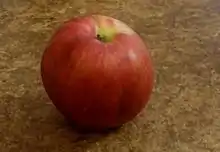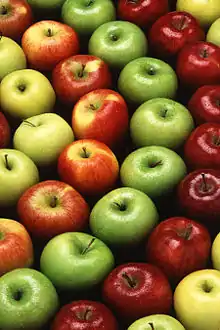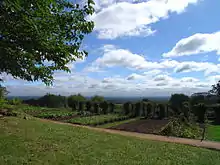Esopus Spitzenburg
Esopus Spitzenburg or Aesopus Spitzenburgh[1] is a variety of apple. It was discovered early in the 18th century near Esopus, New York and is reputed to have been a favorite apple of Thomas Jefferson, who planted several of the trees at Monticello.[2]
| Esopus Spitzenburg | |
|---|---|
 | |
| Genus | Malus |
| Species | Malus domestica |
| Cultivar | Esopus Spitzenburg or Aesopus Spitzenburgh |
| Origin | Found on a tree in Esopus, New York, United States - late 18th century |
In 1922, Ulysses Hedrick described Esopus Spitzenburg (sometimes spelled "Spitzenberg") as "one of the leading American apples ... [A]bout the best to eat out of hand, and very good for all culinary purposes as well."[3] In particular, it is a good apple for baking pies and is also valued as a cider apple.[4]
It is fairly large, oblong and has red skin and crisp flesh. Like many late-season apples, it improves with a few weeks of cool storage, which brings it to its full, rich flavor. Hedrick praised this apple as attractive and keeping well in cold storage, but added that it was imperfect in that the trees lack vigor and are vulnerable to apple scab.[4]
This cultivar is suitable for hardiness zones 4–7 and should be grown in full sun.[5] However, the trees grow unevenly and sometimes the upper branches shade out the lower ones, which can be frustrating to the orcharder. It also has a biennial bearing tendency, and is susceptible to any available apple disease.[6]
Herman Melville mentioned this apple in "Bartleby, the Scrivener".[7]
See also
References
| Wikimedia Commons has media related to Esopus Spitzenburg (apple). |
- Beach, S.A.; Booth, N.O.; Taylor, O.M. (1905), "Esopus Spitzenburg", The apples of New York, Albany: J. B. Lyon, pp. 120–122
- Hatch, Peter J. (January 1995). "Esopus Spitzenburg: Connoiseur Fruit". Twinleaf Journal. Virginia: Thomas Jefferson Foundation. Archived from the original on 2012-04-04. Retrieved 2011-10-15.
- Hedrick, Ulysses Prentiss (1922). Cyclopedia of Hardy Fruits. New York: Macmillan Publishers. OCLC 3714494.
- Karp, David (2004-10-20). "Apples with Pedigrees Selling in Urban Edens". The New York Times. New York. Retrieved 2009-09-16.
- "In Bloom at Monticello: Malus cv 'Esopus Spitzenburg'". Thomas Jefferson Foundation. Archived from the original on 2012-04-04. Retrieved 2011-10-15.
- Esopus-Spitzenberg at Orange Pippin
- Herman Melville: Bartleby, the Scrivener, Putnam’s Monthly Magazine 2, November 1853, p. 549
External links
- "Esopus Spitzenburg", National Fruit Collection, University of Reading and Brogdale Collections, retrieved 17 October 2015

